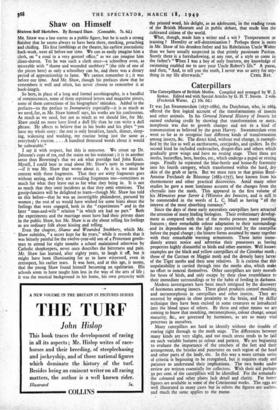Shaw on Himself
Sixteen Self Sketches. By Bernard Shaw. (Constable. 7s. 6d.)
MIL SHAW was a late starter as a public figure, but he is such a strong finisher that he seems always to have been there mocking, preaching and chiding. His first fumblings at the theatre, his earliest journalistic hack-work, were all before our time. We can as easily imagine him a clerk, on " a stool in a very genteel office," as we can imagine him clean-shaven. Yet he was such a clerk once—a schoolboy even, as miserable with " shame and wounded snobbery " (the title of one of the pieces here) as only a schoolboy can be, and there was a dreary period of apprenticeship to fame. We cannot remember it ; it was before our time. And Mr. Shaw, though his prefaces show that he remembers it well and often, has never chosen to remember it at book-length.
So here, in place of a long and formal autobiography, is a handful of reminiscences, some of them reprinted letters and magazine pieces, some of them corrections of his biographers' mistakes. Added to the prefaces—to the preface to Immaturity especially—it is as much as we need, for, as Mr. Shaw himself says, his works are his confessions. As much as we need, but not as much as we should like for Mr. Shaw could no more have lived a dull life than he can write a dull phrase. He affects to believe that in his books and his plays " you have my whole story : the rest is only breakfast, lunch, dinner, sleep- ing, wakening and washing, my routine being just the same as everybody's routine. . . . A hundred thousand words about it would be unbearable."
I say it with respect, but this is nonsense. We c6unt up Dr. Johnson's cups of tea, and the stains on his waistcoat ; it is in another sense than Browning's that we ask what porridge had John Keats. Myself, I could bear to read about Mr. Shaw's taste in toothpaste —if it was Mr. Shaw that wrote about it. As it is, we must be content with these fragments. That they are witty fragments goes without saying, and they are revealing fragments too—sometimes as much for what they leave out as for what they bring in. It is not so much that they omit incidents as that they omit emotions. The gossip-fanciers will be delighted to learn—though Mr. Shaw has told us this before—that he was an incorrigible philanderer, pursued by women ; the rest of us would have wished for some hints about the feelings that were engaged, both in the " experiments " and in the later " man-and-wife " relation " in which sex had no part." Both the experiments and the marriage must have had their private share in the public Shaw, but Mr. Shaw is as shy about telling his feelings as are ordinary folk about kissing and telling. Even the chapter, Shame and Wounded Snobbery, which Mr. Shaw subtitles, " a secret kept for 8o years," while it records that it was bitterly painful for the twelve-year-old son of a Protestant gentle- man to attend for eight months a school maintained otherwise by Catholic shopkeepers, never once describes the bitterness and pain. Mr. Shaw has learned, after eighty years, to laugh it off, but it might have been illuminating for us to have witnessed, even in retrospect, his earlier tears. It was here, and at this age, it seems, that the young Shaw found himself becoming an egalitarian. His schools seem to have taught him less in the way of the arts of life ; it was the musical background in his home, his own precocity with the printed word, his delight, as an adolescent, in the reading room of the British Museum and in public debate, that made him the cultivated citizen of the world.
What, though, made him a writer and a wit ? Temperament or training ? Heredity or self-determination ? Perhaps there is more in Mr. Shaw of his drunken father and his Rabelaisian Uncle Walter than we have usually suspected in that primly passionate Puritan. Surely there is a foreshadowing, at any rate, of a style to come in the father's" When I was a boy of only fourteen, my knowledge of swimming enabled me to save your Uncle Robert's life." A pause, and then, "And, to tell you the truth, I never was so sorry for any-






































 Previous page
Previous page